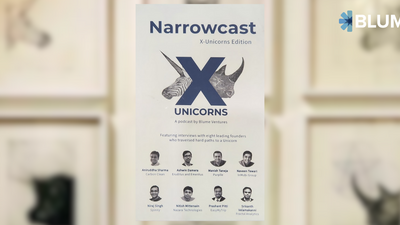At Blume, we navigate the TOFU (Top of funnel/ start-up pipeline) through various channels including Super Angels, Micro-VCs, Incubators-Accelerators, Family Offices, Corporate Innovation labs etc. While our core strength lies in our thesis publications and the invaluable network of founder referrals (Blumiers, who are active founders, ex-founders and CXOs of our portfolios), we also actively engage with the broader ecosystem.
Early-Stage Ecosystem
The early-stage ecosystem in India has seen remarkable activity over the past decade. Capital has become more accessible with the involvement of various stakeholders in the ecosystem - each having a very specific role to play. As per the stage, various kinds of investors with different risk appetites come in to de-risk different aspects of the business.
Founders who are new to the startup ecosystem often apply to incubators (IIT Madras, IIT Bombay, CIIE, etc.) and grants (BIRAC, IDEX, Startup India, Nasscom, etc.) to develop an MVP, get access to mentors, and refine their pitch via demo days. Of course, some first-time founders skip this stage and raise a small amount through friends and family or alumni networks.
Once the MVP (minimum viable product) is ready - founders gear themselves for a pre-seed round - where additional funding is required for developing the product, hiring and market validation. This is when Angel networks, syndicates and Micro-VCs are open to engaging.
Well-connected operators or early employees of growth stage startups (ex Flipkart, InMobi, Freshworks, Unacademy, Meesho etc.) typically skip the incubator stage and raise an early round via a network of Super Angels or Micro-VCs they have a deep connect with.
After having developed some initial traction and market validation, the founders become ready to raise a seed round and accelerate their growth. While these are broad benchmarks, the stages/timelines change as per the sector and founder background. While some sectors/founders inherently require a larger infusion of capital, some skip a few stages and directly raise a seed.
A noteworthy development in the past two years has been the significant transformation within the 'Micro-VC' category. To keep it simple, we define Micro-VCs as funds with a size of $40 million or smaller (includes a few rolling funds + funds pulled together by startup operators with their own/their network’s money pooled into a single vehicle).
💡 Micro-VCs (Micro Venture Capital funds), are investment funds that focus on providing early-stage funding to startups. These funds operate with smaller fund sizes compared to traditional venture capital firms, making them agile and often more accessible to very early-stage founders. Micro-VCs typically invest in idea/ pre-seed/ seed stage rounds, typically enabling founders during their initial stages of development. They work with the founders on early versions of the product and help take it to the market.
Based on our data, we believe there are over 100 Micro-VCs (majority established in 2022-2023), typically investing $100-$500k at the seed/pre-seed stage. These funds often invest at valuations ranging from $1m to $8m and take a 3-8% stake in the start-up. Notably, the General Partners (GPs) leading these micro-VCs are former entrepreneurs, operators, or active angel investors, often bringing sector-focused expertise to the table.

GPs: General Partners
As a seed to pre-Series A fund, we find that Incubator/Accelerator start-ups are often too early in terms of the traction we like to consider for a cheque. Instead, we focus on Micro-VC portfolio companies that have undergone some market validation, typically having raised $200-$500k.
Blume collaborates with 70+ Micro-VCs and deeply engages with 20+ of them. Some of these have honed their strategy — achieving Product-Market Fit (PMF) and remaining steadfast in their niche (be it a sector or a stage) without succumbing to the allure of 'hot deals.' In 2022, we observed a frenzy where a few Micro-VCs were participating with $250,000 in $2m-$5m rounds at $25 million valuations, resulting in a 1% stake. Fortunately, they recognized the unsustainability of this approach as dilution in future rounds would hurt their returns in the long term. They have shifted back towards prioritizing entering early, taking a 3-7% stake, and focussing on ‘value creation’ and ‘robust founder support’ — thereby building a reputation.
Interestingly, we have noticed, sector-focused Micro-VCs with a very specifically designed strategy (which allows them 90-100% coverage on the sector) often draw the attention of growth stage investors that want to closely track the specific sector. Usually, these growth-stage VCs end up backing these funds. We have also seen US-based micro-VCs tap into the India pool of cross-border startups, their key value proposition being US GTM (Go-to-market).
While established founders may question the value that micro-VCs bring, early-stage founders find it relatively hassle-free to deal with a small team vs. a large angel syndicate. Our experience of working closely with this new breed of investors has been positive. However, the proliferation of micro-VCs is a concern, considering venture capital is inherently a patient and long-term endeavor. It remains uncertain how many of these will stand the test of time.
In conclusion, the flourishing micro-VC ecosystem in India showcases a vibrant early-stage funding landscape, which is particularly beneficial to early-stage founders.
A detailed list of Micro-VCs, their core sectors and websites can be found HERE.
Below is a pictorial snapshot of the Micro-VC landscape


Please note that the chart above is based on Blume's interactions with <$40M Micro-VCs. If we have misrepresented or missed adding you, please write to us at jeevesh@blume.vc or sarita@blume.vc, and we will be happy to collaborate/ add/ edit.







